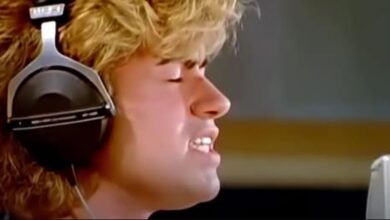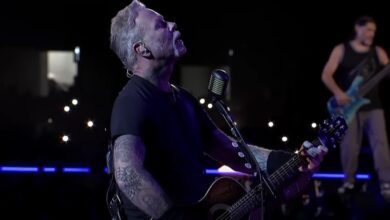Sting Honors Bruce Springsteen with Stunning Performance of “The Rising” at Kennedy Center
Sting, born Gordon Sumner on October 2, 1951, in Wallsend, England, rose to prominence as the lead vocalist and bassist for the rock band The Police in the late 1970s and early 1980s. With hits like “Every Breath You Take,” “Roxanne,” and “Message in a Bottle,” The Police quickly became one of the most successful bands of the era. Sting’s distinctive voice, songwriting talent, and charismatic stage presence contributed to the band’s meteoric rise to fame.
Following the dissolution of The Police in 1984, Sting embarked on a highly successful solo career, releasing a series of critically acclaimed albums that showcased his versatility as a musician. His solo debut, “The Dream of the Blue Turtles” (1985), featured jazz-influenced compositions and earned him Grammy nominations. Subsequent albums, including “Nothing Like the Sun” (1987) and “Ten Summoner’s Tales” (1993), solidified Sting’s reputation as a solo artist of exceptional talent and artistry.
Throughout his career, Sting has explored a wide range of musical styles, from rock and pop to jazz, world music, and classical. His eclectic interests and willingness to experiment have earned him praise from critics and fans alike. In addition to his solo work, Sting has collaborated with artists across genres, further expanding his creative horizons and cementing his status as a musical innovator.
Beyond his musical accomplishments, Sting is also known for his activism and philanthropy. He has been a vocal advocate for human rights, environmental conservation, and social justice, using his platform to raise awareness and effect positive change. His efforts have earned him numerous awards and accolades, including the Amnesty International Award for his work on behalf of refugees and the Rainforest Foundation Fund’s Rainforest Lifetime Achievement Award for his commitment to environmental causes.
Bruce Springsteen, born on September 23, 1949, in Long Branch, New Jersey, emerged as a defining voice of American rock music in the 1970s. Often hailed as “The Boss,” Springsteen’s poetic lyrics, anthemic melodies, and electrifying live performances have made him a cultural icon. From his breakthrough album, “Born to Run” (1975), to later classics like “Born in the U.S.A.” (1984) and “The River” (1980), Springsteen’s music has resonated with audiences around the world.
Springsteen’s songs often explore themes of blue-collar struggles, redemption, and the American Dream, drawing inspiration from his own experiences growing up in working-class New Jersey. His ability to capture the hopes and aspirations of ordinary people has earned him a devoted following and cemented his status as one of the greatest songwriters of his generation.
The Kennedy Center Honors, established in 1978, celebrates individuals who have made significant contributions to the arts and culture of the United States. Each year, the honorees are recognized for their lifetime achievements in music, dance, theater, film, and other artistic disciplines. The event, held annually at the John F. Kennedy Center for the Performing Arts in Washington, D.C., brings together a diverse array of artists, dignitaries, and cultural luminaries to pay tribute to the honorees’ lasting legacies.
Sting’s performance of “The Rising” at the 2009 Kennedy Center Honors was a poignant moment that captured the spirit of resilience and hope embodied in Bruce Springsteen’s music. Written in response to the tragic events of September 11, 2001, “The Rising” is a powerful anthem of strength and solidarity in the face of adversity. Sting’s heartfelt rendition of the song served as a fitting tribute to Springsteen’s ability to uplift and inspire audiences in times of crisis.
As Sting took the stage to perform “The Rising,” his emotional delivery and soulful interpretation resonated deeply with the audience. Against the backdrop of the Kennedy Center’s majestic hall, Sting’s performance transported listeners to a place of reflection and remembrance. His connection to the material was palpable, underscoring the universal themes of resilience and unity that Springsteen’s music embodies.
Throughout the evening, the Kennedy Center Honors paid homage to Bruce Springsteen’s enduring impact on American music and culture. From heartfelt tributes to electrifying performances, the event showcased the breadth and depth of Springsteen’s influence on artists across generations and genres. Sting’s performance was a standout moment that captured the essence of Springsteen’s music and its ability to transcend boundaries and bring people together.
In conclusion, Sting’s performance of “The Rising” at the 2009 Kennedy Center Honors was a testament to the enduring power of music to inspire, uplift, and unite. Against the backdrop of Springsteen’s indelible legacy, Sting’s heartfelt tribute served as a poignant reminder of the resilience and hope that Springsteen’s music continues to evoke in audiences around the world.





